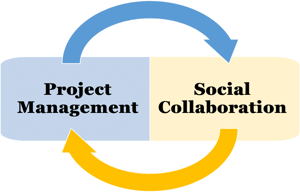
Project Management Software: Gotta Have or Nice To Have
It is hard to count the times I have been asked, “what is the best project management software?” with the implied belief that the right software will ensure project success. Project management software is a very powerful tool helping to manage the team’s tasks, to manage changes, and to monitor the progress towards deliverables. The key idea here is tool. A project manager should be able to determine what type of software tool they need, and/or the features within an existing tool, to support the work.
Do You Even Need Project Management Software?
 In Project Manager presentations and conferences there is often a reaction of disbelief when I state that you can actually complete projects without formal project management software. To prove the point, I share examples such as in Steve Voegl’s book, The Pentagon: A History, in which he shares the 1941 story of incredible planning and work behind the construction an internationally known landmark. The leaders used a combination of people skills and technical knowledge to guide the complicated work, not software.
In Project Manager presentations and conferences there is often a reaction of disbelief when I state that you can actually complete projects without formal project management software. To prove the point, I share examples such as in Steve Voegl’s book, The Pentagon: A History, in which he shares the 1941 story of incredible planning and work behind the construction an internationally known landmark. The leaders used a combination of people skills and technical knowledge to guide the complicated work, not software.
Interestingly, international research firm Gartner’s Use Social Tools to Manage Projects Without Project Management research shows a trend away from project management software and towards social collaboration tools. Employees leverage the software they use daily, Slack for example, to “…facilitate the requirements of single place and collaboration, but do so in ways that employees have already adopted...”
It is important to note that it is the type of work and the team collaboration that drives the software choice. Again, no one software will guarantee project success.
What to Consider When Selecting Project Management Software
Rather than Google search “project management software” and hoping it works out, identify the key features you need based on: type of project management in use (Waterfall, Agile, Disciplined Agile), size of the team, the available software budget, the ramp up or training to use the software, type of project work (IT, software, creative, manufacturing, etc.), and team collaboration needs. Consider functionality such as:
|
Analytics |
Document Management |
Mobile capabilities |
|
Project Management |
Portfolio Management |
Time Tracking |
|
Notifications |
Resource and Skill Matching |
Resource Forecasting |
|
Scheduling |
Reporting |
Budgeting |
|
Project, Task, Resource Views |
Workflow Status |
Progress / Status Tracking |
Use software review sites to help narrow in on which software would address your needs.
- Technology Advice: Project Management
- Project Management.com Top 10 Project Management Software
- PC Magazines Best Project Management Software
The project management software should support your work. As Project Manager Ralph Kliem shares in his PMI.org article “Project Management Software: Friend or Foe?”, it is not what software you use that will get you to success, it is how you use it to plan, organize, control, and lead a project that matters.
Training For Project Management Software
 One of the most widely used Project Management software’s is Microsoft Project. For many, that is the software they are required to use by their company. If you know Waterfall methodology, then Microsoft Project will have familiar terms and features. Given the levels of features it has, and the variety of ways different project managers and organizations use combinations of those features, it is very helpful to complete a Microsoft Project training so that you can design and create new project schedules; work with tasks, resources, and project information; and customize project views, tables and filters.
One of the most widely used Project Management software’s is Microsoft Project. For many, that is the software they are required to use by their company. If you know Waterfall methodology, then Microsoft Project will have familiar terms and features. Given the levels of features it has, and the variety of ways different project managers and organizations use combinations of those features, it is very helpful to complete a Microsoft Project training so that you can design and create new project schedules; work with tasks, resources, and project information; and customize project views, tables and filters.
Project Management Software: Make It Work For you
Successful project managers have a combination of skills which can be bolstered by software but not replaced by it. No software will build trust among the team, maintain your client relationship, or help you negotiate changes in budget, schedule, or deliverables. However, using project management software wisely and to fit the type of environment in which you are working, can increase your project’s success.
About Megan Bell, MPM, PMP
A multi-hyphenate of corporate training, higher education, and creative agency work, Bell’s passion for connecting people to impactful information fuels an evolving career journey. Her portfolio includes conducting learning analytic research and reporting, managing a corporate mentoring program, authoring a blog series, facilitating leadership and career programs, serving on a non-profit board, and even occasional voice work. Bell’s education background encompasses UNC-Chapel Hill, Western Carolina University, and North Carolina State University.




